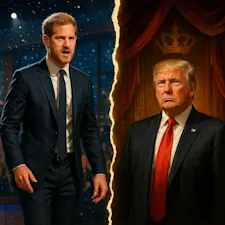
Trump Declares War on Expression With New Exec Order
The burning of an American flag, 2014. Photo courtesy of Loavesofbread under CC BY-SA 4.0.
President Donald Trump's latest executive order targeting flag burning has ignited a rare and fiery backlash from conservative voices, exposing a sharp divide between patriotic fervor and constitutional freedoms. Signed in August 2025, the order reportedly directs the Department of Justice to aggressively prosecute flag-burning incidents, especially those linked to violent or "terroristic" contexts. It also signals an intent to challenge the landmark 1989 Supreme Court ruling in "Texas v. Johnson," which protects flag burning as a form of free speech. The move has sparked a vivid clash between nationalism and civil liberties, with conservatives voicing concerns about executive overreach and the delicate balance between security and free expression.
A Bold Executive Order With a Controversial Aim
President Trump's executive order instructs Attorney General Pam Bondi to prioritize enforcement of laws against flag desecration "to the fullest extent possible," according to the Associated Press, particularly when such acts are tied to violence, hate crimes, or attempts to incite riots. The order also reportedly calls for litigation to clarify the scope of First Amendment protections related to flag burning, aiming to revisit the 1989 Supreme Court decision that struck down state bans on the practice. According to Fox News, Trump framed the order as a necessary response to what he described as a surge in flag burning at protests, including recent demonstrations against Israel and ICE, where flags were reportedly burned alongside violent acts.
Trump publicly stated that flag burning should carry a penalty of one year in jail, saying, "You don't get 10 years, you don't get one month ... You get one year in jail, and it goes on your record, and you will see flag burning stopping immediately," as reported by the Associated Press. However, the executive order itself does not specify sentencing guidelines. The order further targets foreign nationals who burn the flag, reportedly threatening visa revocations, denial of citizenship, and deportation. The White House defended the move as a way to protect the flag from being used as a tool to incite violence, while maintaining respect for the First Amendment.
"President Trump will not allow the American Flag — a special symbol of our country's greatness — to be used as a tool to incite violence and riots that jeopardize the safety of everyday Americans. President Trump will always protect the First Amendment, while simultaneously implementing commonsense, tough-on-crime policies to prevent violence and chaos," White House spokesperson Taylor Rogers said in a statement to Fox News Digital.
Conservative Voices Sound the Alarm
What makes this backlash unusual is that it comes from within Trump's own political base. Prominent conservatives and commentators have reportedly criticized the order as an unconstitutional assault on free speech. Many argue that flag burning, while offensive to some, is a constitutionally protected form of symbolic expression.
Evolutionary biologist Colin Wright called the ban "absurd" and "anti-free speech," warning that outlawing flag burning runs counter to American values, as reported by Fox News. Radio hosts Jesse Kelly and Dana Loesch echoed this sentiment, defending the right to burn the flag as a form of free expression, even if they personally find the act distasteful. Conservative commentator Erick Erickson pointed out that the Supreme Court has long held flag burning as protected speech, and the executive branch cannot simply create new crimes by fiat.
Others expressed frustration with what they see as performative politics. RedState writer Bonchie lamented the signing of what she called an unconstitutional executive order "for show," while Washington Examiner contributor Kimberly Ross emphasized that First Amendment protections apply even to flag burning, regardless of personal feelings about the act, as reported by Fox News. These voices highlight a tension within conservatism between upholding constitutional principles and expressing patriotic outrage.
The Constitutional Crossroads
The 1989 Supreme Court ruling in "Texas v. Johnson" remains the legal bedrock protecting flag burning as political speech. In a narrow 5-4 decision, the Court struck down laws banning flag desecration, affirming that the government cannot prohibit expression simply because it is offensive. The late Justice Antonin Scalia, often praised by Trump, was part of the majority, underscoring the ruling's conservative legal foundation.
Trump's order attempts to carve out exceptions for flag burning that incites "imminent lawless action" or constitutes "fighting words," according to Fox News. These legal standards have been difficult to apply in practice. The administration argues that flag burning in violent or "terroristic" contexts should not enjoy constitutional protection. However, legal experts and civil liberties advocates warn that the executive order risks undermining the First Amendment and setting a dangerous precedent for government censorship.
Public Opinion and Political Stakes
Public opinion on flag burning remains divided. Polls reportedly show a growing number of Americans find flag burning unacceptable, with some supporting legal penalties. Yet, a significant portion still views it as a protected form of political expression. Trump's executive order taps into this cultural fault line, appealing to nationalist sentiments while provoking a constitutional debate.
According to the Washington Post, just a few hours after President Trump signed the order, a protestor, a man claiming to be a veteran, burned a flag in front of the White House.
The order also reflects the broader political context of Trump's second term, where issues of law and order, patriotism, and free speech are fiercely contested. By challenging the "Texas v. Johnson" precedent before a more conservative Supreme Court, Trump is betting on a potential shift in constitutional interpretation that could reshape free speech protections in America.
The Fine Line Between Security and Liberty
At its core, the flag-burning order exposes a fundamental tension in American democracy: how to protect national symbols and public safety without trampling on civil liberties. The executive order's focus on flag burning tied to violence or terroristic acts attempts to thread this needle. Critics argue it risks expanding government power at the expense of free expression.
Legal scholars caution that prosecuting symbolic speech based on subjective interpretations of intent or context could chill dissent and political protest. The order's vague language about enforcement "to the fullest extent possible" leaves room for broad interpretation, raising concerns about potential abuses.
What Comes Next?
The executive order sets the stage for legal battles that could reach the Supreme Court once again. With three Trump-appointed justices on the bench, the administration hopes to overturn or narrow the 1989 ruling. Meanwhile, the Justice Department faces the challenge of enforcing the order without infringing constitutional rights.
For conservatives who champion both patriotism and constitutional freedoms, this moment is a call to reckon with the limits of executive power and the enduring strength of the First Amendment. For the broader public, it is a vivid reminder that the fight over America's symbols is also a fight over the meaning of liberty itself.
Whether you cheer the order as a defense of national pride or jeer it as an overreach that threatens free speech, one thing is clear: the flag-burning debate is far from settled, and the consequences will ripple through American politics and law for years to come.
References: Trump flag burning order sparks online conservative free speech debate | Trump moves to ban flag burning despite Supreme Court ruling that allows it | Burn a flag, get a year in jail': Donald Trump's executive order challenges 1989 Supreme Court ruling; what is America's new flag-burning order? | Man who burned flag near the White House says 'it was my right as a citizen'






















